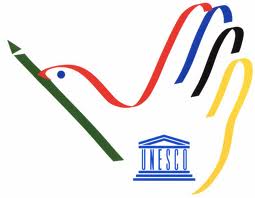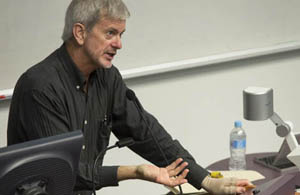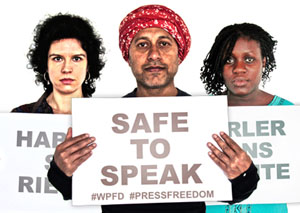 BROWSE THE FULL TEXT OF THE SPEECH, RESPONSES, NEWS AND INTERVIEWS LINKS HERE.
BROWSE THE FULL TEXT OF THE SPEECH, RESPONSES, NEWS AND INTERVIEWS LINKS HERE.
The May 3 UNESCO World Press Freedom Day 2013 lecture at AUT University's new Sir Paul Reeves communications precinct hosted by the Pacific Media Centre with support from the UNESCO New Zealand National Commission. It can be watched via live streaming at AUT On Demand.
Dr Mark Pearson, Professor of Journalism and Social Media at Griffith University, Queensland, and Australian correspondent of the Paris-based global media freedom organisation Reporters sans frontières (Reporters Without Borders). The title of his lecture is "Press freedom, social media and the citizen".
Chaired by Professor Judy McGregor, Head of the School of Social Sciences and Public Policy, AUT University.
Professor Pearson is also Australian correspondent for Paris-based global media freedom advocacy organisation Reporters sans frontières (Reporters Without Borders). Professor Pearson has combined careers in teaching and journalism. He was special reports editor of The Australian newspaper and his work has been published in the Wall Street Journal, Far Eastern Economic Review, The Fiji Times, the Pacific Area Newspaper Publishers Association Bulletin and Crikey.com.au
 Over the past two decades Professor Pearson has been involved with Pacific journalism at several levels. As author of The Journalist’s Guide to Media Law (4th edition with Mark Polden, Allen & Unwin, 2011), he has conducted media law training sessions for Pacific journalists in Fiji, Papua New Guinea, Samoa and Tonga. Professor Pearson is on the editorial board for the Pacific Journalism Review and the Australian Journalism Review. His latest book is Blogging and Tweeting Without Getting Sued (Allen & Unwin, 2012). He blogs from journlaw.com and tweets from @journlaw
Over the past two decades Professor Pearson has been involved with Pacific journalism at several levels. As author of The Journalist’s Guide to Media Law (4th edition with Mark Polden, Allen & Unwin, 2011), he has conducted media law training sessions for Pacific journalists in Fiji, Papua New Guinea, Samoa and Tonga. Professor Pearson is on the editorial board for the Pacific Journalism Review and the Australian Journalism Review. His latest book is Blogging and Tweeting Without Getting Sued (Allen & Unwin, 2012). He blogs from journlaw.com and tweets from @journlaw
Background:
The media landscape has evolved over the past two decades, creating new opportunities for exchange and dialogue, and for sharing knowledge and information through new platforms. However, it has yet to be translated into stronger respect for fundamental freedoms – particularly regarding the safety of those doing journalism. While progress has been made over the last 20 years, many old challenges remain strong, and new threats to freedom of expression are emerging in the digital news environment.
 The date of May 3 was chosen to commemorate the adoption of the historic Declaration of Windhoek during a meeting of African journalists in Namibia convened by UNESCO on 3 May 1991. The Declaration states that press freedom is only possible in a free, independent, and pluralistic media environment.
The date of May 3 was chosen to commemorate the adoption of the historic Declaration of Windhoek during a meeting of African journalists in Namibia convened by UNESCO on 3 May 1991. The Declaration states that press freedom is only possible in a free, independent, and pluralistic media environment.
This is a precondition for journalists to be safe to practice their craft, and for crimes against press freedom to be investigated swiftly and thoroughly.
This year, World Press Freedom Day focuses on ensuring the physical and psychological safety of journalists on all media platforms, addressing the high impunity level of crimes against press freedom.
It also puts attention on freedom of expression on the Internet as a precondition for digital safety of journalists. This is a pressing issue for press freedom as more than 600 journalists and media workers have been killed in the last 10 years while reporting news to the general public.
In other words, on average every week a journalist dies while doing his or her job. In 2012 alone, UNESCO’s Director-General condemned the killings of 121 journalists, almost double the annual figures of 2011 and 2010.
Live streaming link at AUT On Demand: http://tinyurl.com/cryjgu6
[Streaming begins at 5.30pm, May 3]
Secondary link (if the first does not work): http://ondemand.aut.ac.nz/Mediasite/Play/c4a54db0a7794ffda37bbd67359bb7571d
Professor Pearson talks to Pacific Scoop
Last year's PMC seminar on World Press Freedom at AUT
UNESCO World Press Freedom Day 2013
NZ National Commission for UNESCO
2012 Media Freedom video by AUT students


